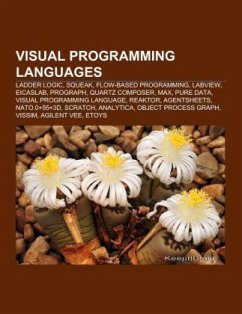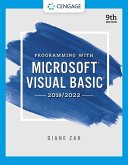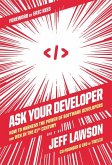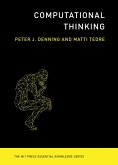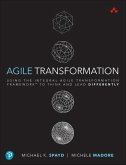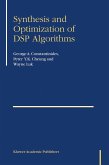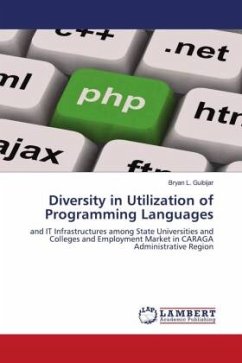Source: Wikipedia. Pages: 53. Chapters: Ladder logic, Squeak, Flow-based programming, LabVIEW, EICASLAB, Prograph, Quartz Composer, Max, Pure Data, Visual programming language, Reaktor, AgentSheets, Nato.0+55+3d, Scratch, Analytica, Object Process Graph, VisSim, Agilent VEE, Etoys, Simulink, Limnor, Alice, Mama, Subtext, HyperNext, Usine, Stagecast Creator, Illumination Software Creator, Tersus, Google App Inventor, Lava, Kyma, Baltie, HiAsm, Vvvv, OpenMusic, VSXu, ToonTalk, Automator, AMBIT, Smalltalk YX, Ptolemy Project, Piet, Stateflow, Symbolic Sound Corporation, AppWare, DRAKON, Bidule, TOMVIEW, Deutsch limit, Lily, FxPlug, MST Workshop, ThingLab, Fabrik, CODE, GNU Radio Companion. Excerpt: In computer science, flow-based programming (FBP) is a programming paradigm that defines applications as networks of "black box" processes, which exchange data across predefined connections by message passing, where the connections are specified externally to the processes. These black box processes can be reconnected endlessly to form different applications without having to be changed internally. FBP is thus naturally component-oriented. FBP is a particular form of dataflow programming based on bounded buffers, information packets with defined lifetimes, named ports, and separate definition of connections. The FBP development approach views an application not as a single, sequential, process, which starts at a point in time, and then does one thing at a time until it is finished, but as a network of asynchronous processes communicating by means of streams of structured data chunks, called "information packets" (IPs). In this view, the focus is on the application data and the transformations applied to it to produce the desired outputs. The network is defined externally to the processes, as a list of connections which is interpreted by a piece of software, usually called the "scheduler". The processes communicate by means of fixed-capacity connections. A connection is attached to a process by means of a port, which has a name agreed upon between the process code and the network definition. More than one process can execute the same piece of code. At any point in time, a given IP can only be "owned" by a single process, or be in transit between two processes. Ports may either be simple, or array-type, as used e.g. for the input port of the Collate component described below. It is the combination of ports with asynchronous processes that allows many long-running primitive functions of data processing, such as Sort, Merge, Summarize, etc., to be supported in the form of software black boxes. Because FBP processes can continue executing as long they have data to work
Bitte wählen Sie Ihr Anliegen aus.
Rechnungen
Retourenschein anfordern
Bestellstatus
Storno

